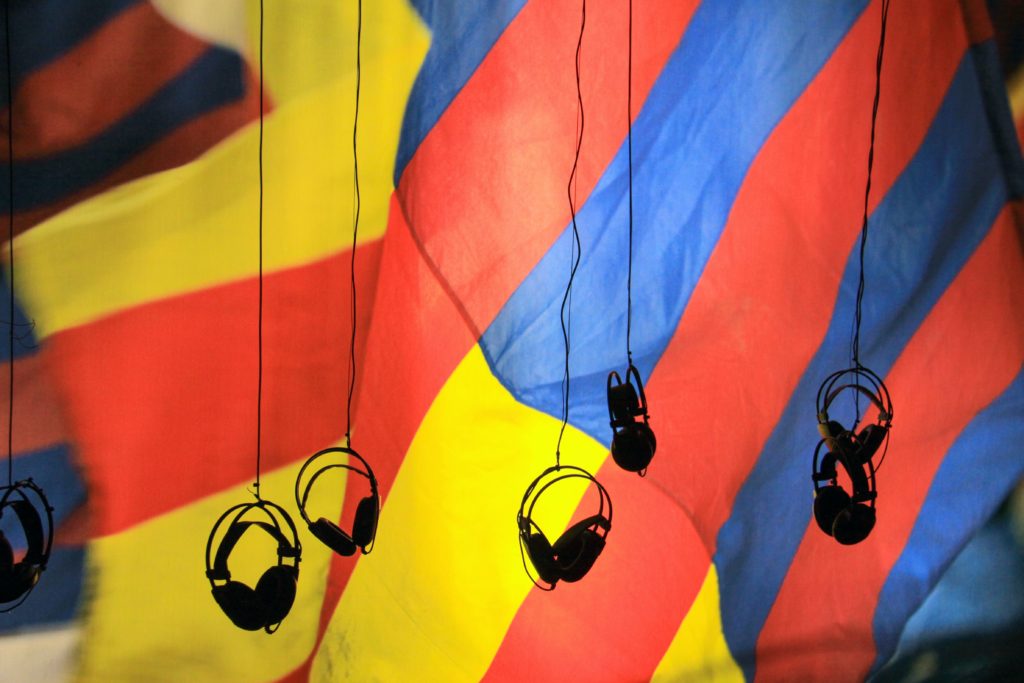Neste vídeo do canal Espresso English são apresentadas dicas para melhorar a sua compreensão da língua inglesa falada. O vídeo nos explica que é natural não entender tudo da primeira vez e que a melhoria da compreensão do inglês falado é um processo, que requer dedicação diária. É um processo por vezes frustrante, pois certamente deixaremos de entender algumas partes dos áudios que ouvirmos. Ao mesmo tempo, isto é um fator natural e esperado, não se consegue identificar todos os sons imediatamente, e não devemos nos desencorajar e desistir. O progresso e a autonomia vêm com o tempo e a constância no estudo.
Referências Adicionais
No vídeo são citados os sites abaixo, com conteúdo para praticar a melhoria da compreensão da língua inglesa:
- English Listening Lesson Library Online (Elllo.org)
- Voice of America English News
- BBC Learning English – 6 minute English
| Audio | |
|---|---|
Normal | Slow |
| English Transcript | Tradução |
| If you have difficulties in listening you're not alone. | Se você tem dificuldades em ouvir, não está sozinho. |
| This is one of the most common problems for English learners. | Este é um dos problemas mais comuns para estudantes de inglês. |
| It's frustrating and embarrassing when you can't understand spoken English but in this lesson I'm going to explain why it's so difficult and teach you how to improve. | É frustrante e embaraçoso quando você não consegue entender o inglês falado, mas nesta lição vou explicar por que é tão difícil e te ensinar como melhorar. |
| Listening to English and successfully understanding it is difficult for three reasons. | Entender e compreender o inglês falado com sucesso é difícil por três razões. |
| First: many English words are pronounced differently from their written form. | Primeiro: muitas palavras em inglês são pronunciadas de forma diferente da forma escrita. |
| We have words with silent letters like "thought", "island" and "muscle". | Temos palavras com letras silenciosas como "thought", "island" e "muscle". |
| Also, many letters can be pronounced in different ways, like the "a" in "Apple", "father" and "game". | Além disso, muitas letras podem ser pronunciadas de maneiras diferentes, como o "a" em "Apple", "father" e "game". |
| Second: when native speakers talk fast we link the words together. | Segundo: quando falantes nativos falam rápido, eles ligam as palavras umas nas outras. |
| Native speakers often connect the words when speaking fast, we don't pronounce every individual word clearly. | Falantes nativos geralmente conectam as palavras ao falar rápido, nós não pronunciamos todas as palavras de maneira clara. |
| So, the question "how are you feeling today?" sounds like "howrya feelin' today?" | Então, a pergunta "How are you feeling today?" soa como "Howrya feelin' today?" |
| "I'm going to have lunch" sounds like I'm gonnahav lunch". | "I'm gonna have lunch" soa como "I'm gonnahav lunch". |
| This linking happens in all spoken English sentences and it's one big reason that it's so difficult to understand. | Essa ligação ocorre em todas as frases em inglês falado e é um dos principais motivos por que é tão difícil entender. |
| Finally: too little practice. | Finalmente: pouca prática. |
| Most students read too much and don't listen to enough English. | A maioria dos alunos lê muito e não ouve inglês suficientemente. |
| But remember that babies and young children learn English by listening first and reading later, so English listening practice is essential. | Mas lembre-se de que bebês e crianças aprendem inglês ouvindo primeiro e lendo depois, portanto, praticar escutar a língua inglesa é essencial. |
| Okay, now that you know why listening is difficult here is how to improve it. | Ok, agora que você sabe por que ouvir é difícil, vejamos como melhorar. |
| There are two ways: practicing every day and practicing the right way. | Existem duas maneiras: praticar todos os dias e praticar da maneira certa. |
| Tip number one is to practice every day. | A dica número um é praticar todos os dias. |
| Create the habit of listening to English for 15 minutes daily even if you're busy and you don't have much time. | Crie o hábito de ouvir inglês por 15 minutos diariamente, mesmo se você estiver ocupado e não tiver muito tempo. |
| You can listen while driving to work or school, taking public transportation, exercising, or doing housework. | Você pode ouvir enquanto dirige para o trabalho ou para a escola, usando transporte público, exercitando ou fazendo tarefas domésticas. |
| Now, what should you listen to? | Agora, o que você deve ouvir? |
| Here are three sites with great audio and accompanying text. | Aqui estão três sites com ótimo áudio e texto. |
| VOA special English for American English news, for British English news and lifestyle, and elllo.org for dialogues and conversations in many different accents of English. | Inglês especial da VOA para notícias em inglês americano, para notícias e estilo de vida em inglês britânico e elllo.org para diálogos e conversas em vários sotaques diferentes do inglês. |
| Tip number two is to practice the right way. | A dica número dois é praticar da maneira certa. |
| What does this mean? | O que isto significa? |
| Well there is a right way and a wrong way to practice English listening. | Bem, existe um caminho certo e um caminho errado para praticar a compreensão da língua inglesa. |
| The wrong way to do English listening practice is to try to listen once, you don't understand every word, and you get frustrated, so you give up and stop practicing after the first try. | A maneira errada de praticar a audição em inglês é tentar ouvir uma vez, você não entende cada palavra e fica frustrado; assim, desiste e para de praticar após a primeira tentativa. |
| To do English listening practice the right way, the first step is to relax and know that it's completely normal to have limited understanding the first time you listen. | Para praticar a escuta em inglês da maneira certa, o primeiro passo é relaxar e saber que é completamente normal ter um entendimento limitado na primeira vez que você escuta. |
| You need to listen at least three times. | Você precisa ouvir pelo menos três vezes. |
| Listen the first time for the general topics. | Ouça pela primeira vez para identificar os tópicos gerais. |
| Don't try to understand every word, just try to understand the main ideas. | Não tente entender cada palavra, apenas tente entender as idéias principais. |
| Listen again and now try to understand some more specific details. | Ouça novamente e agora tente entender alguns detalhes mais específicos. |
| Again, remember that it's okay not to catch every word. | Novamente, lembre-se de que não há problema em não entender todas as palavras. |
| Listen the third time while reading the transcript, the text. | Ouça a terceira vez enquanto lê a transcrição, o texto. |
| Now you can pay attention to the individual words and see if your previous understanding was correct. | Agora você pode prestar atenção às palavras individuais e verificar se seu entendimento anterior estava correto. |
| This type of listening, from more general to more specific, is the most effective way to practice and improve your English listening ability. | Esse tipo de audição, de mais geral a mais específica, é a maneira mais eficaz de praticar e melhorar sua capacidade de ouvir o inglês. |
| Your action item for today is to try it. | Seu item de ação para hoje é experimentá-lo. |
| Go to one of the websites linked under this video and listen to one program three times. | Vá para um dos sites vinculados neste vídeo e ouça um programa três vezes. |
| If you practice English listening every day for 15 minutes and you practice the right way, listening three times to the same audio from general to specific, your understanding of spoken English is guaranteed to improve fast. | Se você pratica a audição em inglês todos os dias por 15 minutos e pratica da maneira certa, ouvindo três vezes o mesmo áudio, de geral a específico, sua compreensão do inglês falado certamente melhorará rapidamente. |
Contagem de Palavras
A tabela abaixo exibe as palavras encontradas nesta vídeo bem como o número de vezes em que aparecem.
| Freq. | Palavra | Freq. | Palavra | Freq. | Palavra |
|---|---|---|---|---|---|
| 33 | to | 24 | the | 24 | and |
| 19 | english | 16 | you | 13 | listening |
| 13 | is | 11 | practice | 10 | listen |
| 9 | for | 8 | way | 7 | every |
| 6 | understand | 6 | try | 6 | this |
| 6 | of | 6 | it's | 6 | in |
| 6 | first | 5 | words | 5 | three |
| 5 | that | 5 | so | 5 | right |
| 5 | one | 5 | have | 5 | don't |
| 4 | your | 4 | word | 4 | understanding |
| 4 | time | 4 | now | 4 | like |
| 4 | improve | 4 | if | 4 | difficult |
| 4 | are | 3 | when | 3 | we |
| 3 | today | 3 | times | 3 | spoken |
| 3 | specific | 3 | most | 3 | more |
| 3 | many | 3 | it | 3 | I'm |
| 3 | how | 3 | general | 3 | from |
| 3 | fast | 3 | day | 3 | can |
| 3 | a | 2 | you're | 2 | wrong |
| 2 | with | 2 | why | 2 | while |
| 2 | what | 2 | ways | 2 | two |
| 2 | too | 2 | tip | 2 | there |
| 2 | text | 2 | speakers | 2 | sounds |
| 2 | remember | 2 | reading | 2 | pronounced |
| 2 | practicing | 2 | or | 2 | okay |
| 2 | number | 2 | not | 2 | news |
| 2 | native | 2 | much | 2 | minutes |
| 2 | lunch | 2 | letters | 2 | know |
| 2 | individual | 2 | here | 2 | going |
| 2 | do | 2 | different | 2 | but |
| 2 | audio | 2 | again | 1 | young |
| 1 | written | 1 | work | 1 | well |
| 1 | websites | 1 | was | 1 | voa |
| 1 | video | 1 | up | 1 | under |
| 1 | type | 1 | transportation | 1 | transcript |
| 1 | topics | 1 | together | 1 | thought |
| 1 | third | 1 | their | 1 | teach |
| 1 | talk | 1 | taking | 1 | successfully |
| 1 | students | 1 | stop | 1 | step |
| 1 | special | 1 | speaking | 1 | some |
| 1 | sites | 1 | silent | 1 | should |
| 1 | sentences | 1 | see | 1 | second |
| 1 | school | 1 | same | 1 | relax |
| 1 | reasons | 1 | reason | 1 | read |
| 1 | question | 1 | public | 1 | pronounce |
| 1 | program | 1 | problems | 1 | previous |
| 1 | pay | 1 | org | 1 | once |
| 1 | often | 1 | normal | 1 | need |
| 1 | muscle | 1 | mean | 1 | main |
| 1 | little | 1 | linking | 1 | linked |
| 1 | link | 1 | limited | 1 | lifestyle |
| 1 | lesson | 1 | least | 1 | learners |
| 1 | learn | 1 | later | 1 | just |
| 1 | item | 1 | island | 1 | ideas |
| 1 | howrya | 1 | housework | 1 | happens |
| 1 | habit | 1 | guaranteed | 1 | great |
| 1 | gonnahav | 1 | go | 1 | give |
| 1 | get | 1 | game | 1 | frustrating |
| 1 | frustrated | 1 | form | 1 | finally |
| 1 | feeling | 1 | feelin' | 1 | father |
| 1 | explain | 1 | exercising | 1 | even |
| 1 | essential | 1 | enough | 1 | embarrassing |
| 1 | elllo | 1 | effective | 1 | driving |
| 1 | doing | 1 | does | 1 | difficulties |
| 1 | differently | 1 | dialogues | 1 | details |
| 1 | daily | 1 | create | 1 | correct |
| 1 | conversations | 1 | connect | 1 | completely |
| 1 | common | 1 | clearly | 1 | children |
| 1 | catch | 1 | can't | 1 | by |
| 1 | busy | 1 | british | 1 | big |
| 1 | be | 1 | babies | 1 | attention |
| 1 | at | 1 | apple | 1 | american |
| 1 | also | 1 | alone | 1 | all |
| 1 | after | 1 | action | 1 | accompanying |
| 1 | accents | 1 | ability |











Estou gostando muito e aprendendo muito, pois quero muito aprender inglês. Mas não é fácil.